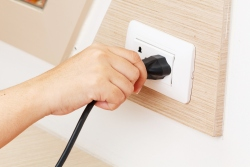How is the electrical wiring in your house? It might be that you don't really think about it a lot, after all, we take electricity for granted. However, it's a good idea to take note of these electrical warning signs.
 If you notice a light flickering or dimming, try replacing the bulb first. If that doesn't work, it's time to call in an electrician.
If you notice a light flickering or dimming, try replacing the bulb first. If that doesn't work, it's time to call in an electrician. According to Nick Basson from Electrician Cape Town, if not handled correctly, electricity can be dangerous.
In fact, he says the Fire Protection Association of South Africa estimates that over 3 000 fires a year could be related to electrical faults. Electrical faults in the home can lead to fires.
So how can you reduce that risk and keep your home safe? Nick says the key is to be vigilant. He says keep an eye out for these tell-tale signs of electrical problems.
1. Flickering or dimming lights
Light fittings don't take a lot of power to run, so there really is no reason for a healthy light fitting to flicker or dim.
Flickering or dimming lights can be caused by faults in the fitting itself or by an appliance like a washing machine or air conditioner drawing power from the same circuit. Faults or loose wiring in the circuit breaker can also cause problems with your light fittings.
Of course, sometimes the answer is as simple as a faulty or loose bulb. If you notice a light flickering or dimming, try replacing the bulb first. If that doesn't work, it's time to call in an electrician.
2. Blown fuses and tripped circuit breakers
 If the sparking or smell is coming from a specific appliance, stop using that appliance and either call a qualified repairman or replace it.
If the sparking or smell is coming from a specific appliance, stop using that appliance and either call a qualified repairman or replace it.The occasional blown fuse or tripped circuit breaker isn't cause for concern. However, if you notice fuses blowing or circuit breakers tripping regularly, your home might have an electrical problem.
This is true no matter how old it is, but old houses are certainly more prone to tripping as your fuse box might need updating.
If you keep getting blown fuses or tripped circuit breakers, it's a good idea to call in a professional to take a look.
3. Burning odours or sparks
When it comes to electricity, you shouldn't smell or see it. If you see sparks coming from an outlet, an electrical panel or you notice a burning odour from an outlet, you need to stop using that outlet and call an electrician immediately. A burning smell could indicate the start of an electrical fire, so there's no time to waste.
If the sparking or smell is coming from a specific appliance, stop using that appliance and either call a qualified repairman or replace it.
 Power outlets and switches should work consistently with no issues. If you notice an outlet or switch that doesn't work, or that only works from time to time, it's a sure sign that something isn't right.
Power outlets and switches should work consistently with no issues. If you notice an outlet or switch that doesn't work, or that only works from time to time, it's a sure sign that something isn't right.4. Outlets or switches that don't work
Power outlets and switches should work consistently with no issues. If you notice an outlet or switch that doesn't work, or that only works from time to time, it's a sure sign that something isn't right.
An outlet or switch that fails to work could be a sign that the internal wiring is loose, or that there is a fault inside the switch or outlet unit. You'll want to get that checked out before continuing to use it.
5. Hot outlets or fittings
Outlets and light fitting should be comfortable to touch. Slight heat is normal, but anything more than that indicates a problem - it could be that the outlet has a fault.
If you're unsure whether the issue is with the outlet or with the appliance, you can try plugging the appliance into a different outlet to see what happens.
Too much heat around a light fitting can be caused by using the wrong wattage bulb, so do make sure your lights only have the correct bulbs in them.
 Don't take chances with electricity. If you notice any of the warning signs outlined above, it's time to put in a call to an electrician.
Don't take chances with electricity. If you notice any of the warning signs outlined above, it's time to put in a call to an electrician.6. A buzzing sound
Electricity is supposed to be silent. If you notice a buzzing or humming noise, you could have an electrical issue on your hands.
A buzzing sound means that electricity is no longer flowing smoothly, but is jumping between connections. This can be due to a frayed cord, damaged prongs or another electrical fault.
If you hear a buzzing, call an electrician. If you notice it coming from a particular socket, switch that socket off and stop using it until the problem is solved.
Don't take chances with electricity. If you notice any of the warning signs outlined above, it's time to put in a call to an electrician. They'll have the right equipment and know-how to carry out a thorough test and make sure your home wiring is safe.







